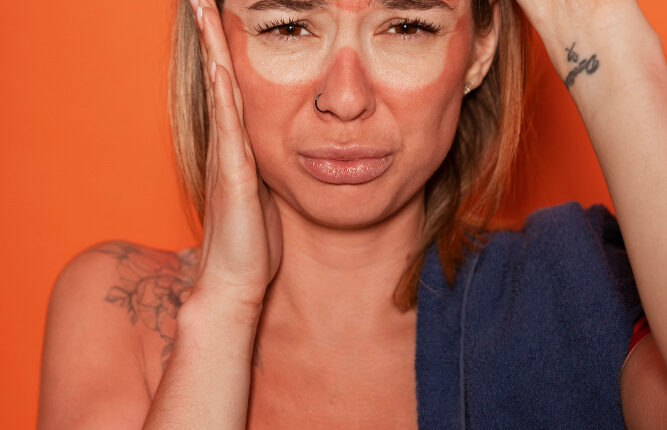Sunburn is a common and painful result of overexposure to the sun’s ultraviolet (UV) rays. While prevention is the best strategy, knowing how to treat sunburn effectively is essential for minimizing discomfort and promoting healing. Here are some practical tips and remedies to handle sunburn and help your skin recover.
1. Cool Down Your Skin
The first step in treating sunburn is to cool your skin. Take a cool bath or shower to reduce the heat on your skin. Avoid using harsh soaps or scrubbing, which can irritate the burned area. After bathing or showering, use a soft towel to pat your skin dry gently. It’s important to leave some moisture on your skin to help prevent excessive drying. Gently dabbing your skin rather than rubbing vigorously can help maintain its natural moisture balance.
2. Hydrate Your Skin
Sunburn dehydrates your skin, so it’s important to replenish that moisture. Apply aloe vera gel or a moisturizer with soothing ingredients like glycerin, shea butter, or soy. Aloe vera is especially beneficial due to its anti-inflammatory properties, which help reduce redness and pain.
3. Stay Hydrated
Sunburn can lead to dehydration, so drink plenty of water to help your body recover. Staying hydrated aids in the healing process and prevents further complications. Consider consuming electrolyte-rich drinks and water-rich fruits like watermelon and cucumber to boost your hydration levels.
4. Protect Your Skin from Further Damage
While your skin is on the mend, stay out of the sun to aid in the healing process. Wear protective gear like long sleeves, stylish hats, and trendy sunglasses. Apply a broad-spectrum sunscreen with an SPF of at least 30 to all exposed areas, even on cloudy days. Don’t forget to reapply every two hours or even more frequently if you’re swimming or sweating.
5. Manage Pain and Discomfort
Sunburn can be painful, and over-the-counter pain relievers like ibuprofen or acetaminophen can help reduce pain and inflammation. Follow the recommended dosage on the packaging. Additionally, you can apply a cool compress or take an oatmeal bath to alleviate discomfort and reduce swelling.

6. Moisturize Regularly
Keeping your skin moisturized is crucial to prevent peeling and further irritation. Keep your skin soft and hydrated by applying a gentle, fragrance-free moisturizer throughout the day. Avoid products with petroleum, as they can trap heat in your skin. Opt for creams or lotions containing hyaluronic acid and ceramides to restore
your skin’s moisture barrier.
7. Avoid Picking or Peeling
As your skin heals, it may start to peel. Resist the urge to pick at peeling skin, as this can slow down the healing process and increase the risk of infection. Allow your skin to shed naturally. If blisters form, avoid popping them, as this can also lead to disease.
8. Use Natural Remedies
Several natural remedies can soothe sunburned skin. Applying plain yoghurt, cooled green tea bags, or a paste made from baking soda and water can provide relief. These remedies have anti-inflammatory and cooling properties that can help reduce pain and promote healing.
9. Recognize Severe Symptoms
In some cases, sunburn can cause severe symptoms like fever, chills, nausea, or extensive blistering. If you notice any of these symptoms, seeking medical help right away is crucial. Severe sunburn may require professional treatment to prevent complications such as infections or heat exhaustion.
10. Know When to Seek Medical Help
Most can be treated at home, but it might need medical attention if it’s a severe case. If you have extensive blistering, signs of infection (such as pus or red streaks), or if your sunburn covers a large area of your body, consult a healthcare provider. Also, seek emergency medical care if you experience dizziness, confusion, or fainting.
Conclusion
Handling sunburn involves immediate cooling, proper hydration, pain management, and skin protection from further damage. By following these tips and remedies, you can alleviate the discomfort of sunburn and promote faster healing. Don’t forget that staying safe in the sun is crucial! Protect your skin from harmful UV rays by wearing sunscreen and protective clothing. These precautions can help you enjoy the sun safely and keep your skin healthy.









